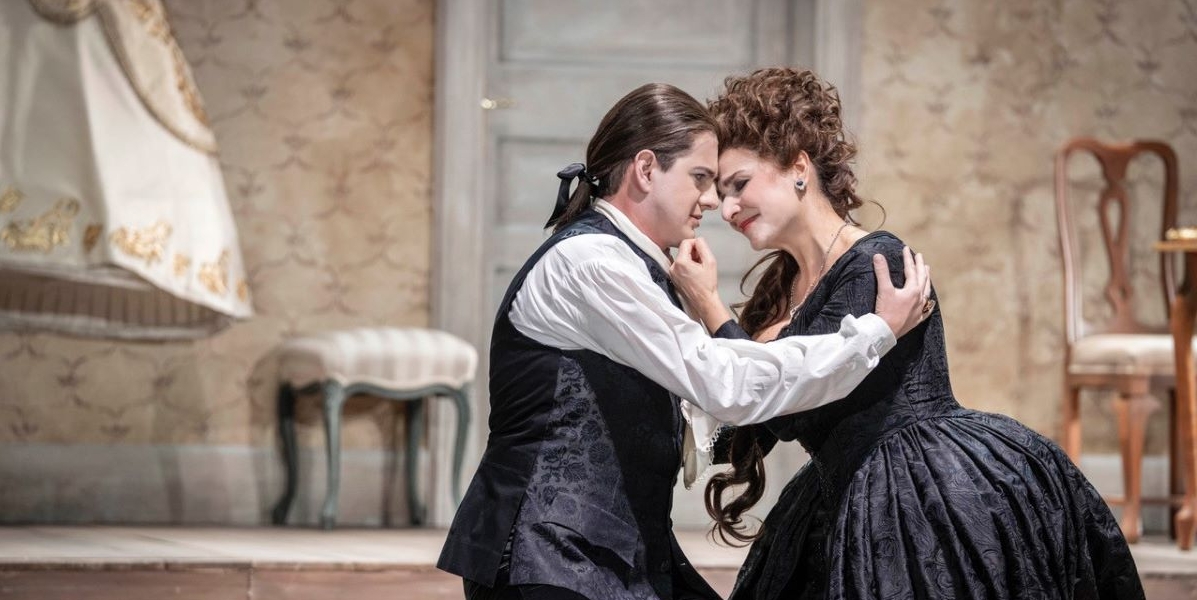Monte Carlo Opera has a new, and for the first time, female artistic director, the Queen of Coloratura, Cecilia Bartoli. With Alcina, Handel concludes Ariosto’s trilogy from Orlando Furioso (Orlando and Ariodante – seen here last year) The action this time is Alcina’s magic island. The enchantment happens to be unfortunate for the lovers with whom Alcina gets bored. Their fate is to be turned into animals, rocks, rivers, trees or stones.
Christof Loy’s production is thought provoking. The acts take place at different periods and location. His use of 84-year-old Katherine Sehnert as Cupido is particularly poignant, emphasising the fleeting world of beauty. The conductor of the Musiciens de Prince, Gianluca Capuano, has a long association with Bartoli, therefore his musical abilities are fine tuned for these singers, the accompaniment to Ah! Mio cor, being a perfect example.
Handel has been criticised for being long and tedious due to the da capo sections repeated after every aria, which should be cut. I reject the criticism because it is the da capo sections which make the opera exciting. In Handel’s time, the da capo was more important than anything else, because these vocal fireworks showed off the skill and artistry of the singer, and the public would come to hear their favourite superstars of the day perform their individual magic. The castrati were excellent musicians, therefore the da capo variations would be sung differently by each singer according to their vocal abilities and prowess. This is equally true today, not only for Handel, but Rossini and other operas where there are da capos. The trick is to be familiar with the tune the first time round, and listen out for the variations in the da capos.
This logically leads to the rightly acclaimed superstar, Cecilia Bartoli as Alcina. She is one of the few GOATs (Greatest Artist of All Time) singing today, and worth a long detour to hear. There is never a bad note, never a tasteless variation, a gorgeously beautiful, warm sound, and stunning technique which she had from a very young age as demonstrated in her first Vivaldi CD. One of the best Handel scena ed arias ever written was for Alcina in Act II, Ah! Mio cor. The scene is 13 minutes long and you could have heard a pin drop. When she realises she has lost Ruggerio, and also realises that he is the only man she has ever loved, her powers instantly disappear. The musical moment it happens is reflected by her doubling up in physical pain followed by a long Aaahh! A reflective pause. Then ‘mio cor’, both ritenuto depicting the physical and mental pain. She has a masterful use of the ritardando, for perfect dramatic effect. Then the orchestra starts with very quiet, very slow beats to reflect Alcina’s heartbeat which only just there, she is only just alive. Schernito sei (my heart, you are betrayed).
Originally written for the castrato Carestini, the role of Ruggerio is sung nowadays both by mezzo-sopranos (as in the recent ROH production), and counter-tenors. Today we heard French counter-tenor Phillippe Jarounovsky, one of the best counter-tenors singing today. Having sung this with Bartoli seven times before, he is very experienced and comfortable with it, although he has said he is still trying to make Ruggiero a likeable character, and can’t understand why he is the only man Alcina has ever loved. Personally, I think the opera is better balanced with a counter-tenor in the role, the principal four being otherwise sung by women. An accomplished musician (he won awards for the violin, and piano, before turning to singing), his variations in the da capo sections, especially ‘sta nel’ircana’, are wonderfully virtuoustic. At 45, he is fortunate to look much younger, which adds to onstage credibility. So, too, are his variations in the verdi prati da capo section, delicately caressing the phrases second time round. He has stated he is considering giving up baroque roles in favour of contemporary and conduction, which would be a tragic waste, and leave a large gap in this repertoire which would be hard to fill.
Varduhi Abrahamyan, the Armenian-French mezzo-soprano gave a very strong performance. Her rich mezzo voice coloratura was impressive especially in the low lying section in vorrei vendicarmi in Act II, tricky enough standing still, but this was sung whilst ripping off the male attire and become a woman.
Sandrine Piau as her sister Morgana, equally aging at the end of her powers of attraction, has sung this role in Paris and Salzburg, and knows how to perform it to full effect. Vocally a contrast to Bartoli, her high soprano dances and springs for ‘tornami a vagghegiar’, the difficult runs easily dealt with, however, without the top G at the end famously sung by Natalie Dessay. ‘Credete al mio dolore’ as she tries to win back Oronte, well sung by Maxim Mironov, in Act III was intensely moving.
The final honours must go to Cecilia Bartoli, who, apart from astounding singing in the title role, is also the new Directrice of the Monte Carlo opera. This bodes a terrific season this year, and in the future.

